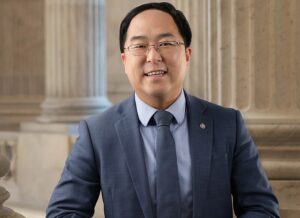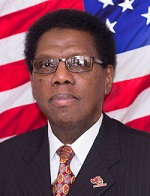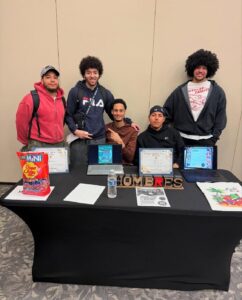Irvin Moreno-Rodriguez Becomes First Latino To Lead Sara and Sam Schoffer Holocaust Resource Center at Stockton
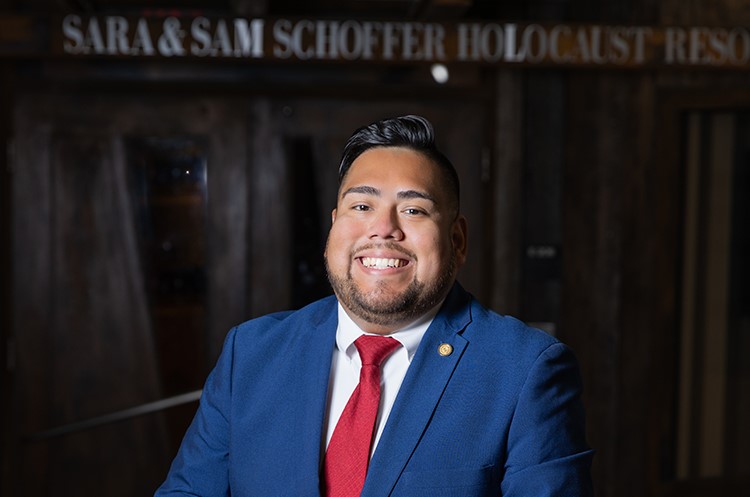
Photo of Irvin Moreno-Rodriguez by Susan Allen/Stockton University.
AC JosepH Media
GALLOWAY — “One person can make a difference, and that person can most definitely be you.”
That is the guiding principle that drives Irvin Moreno-Rodriguez as the new director of the Sara and Sam Schoffer Holocaust Resource Center at Stockton University. It’s a variation of a statement his predecessor Gail Rosenthal used to tell students who came to the center for guidance.
“The way to a better future is through education. Holocaust education can really show students that in a tough, sometimes bleak world where everyone is shouting at each other and no one is getting along, they can be solutions,” said Moreno-Rodriguez, who when appointed in July became the first Hispanic to head one of the 30 Holocaust centers in New Jersey. “They can make the difference, and to never forget that.”
Moreno-Rodriguez, 30, of Pleasantville, has been the center’s assistant director and a member of the New Jersey Commission on Holocaust Education since 2021. In addition to earning a bachelor’s degree in Criminal Justice from Stockton, he also has his master’s in Holocaust and Genocide Studies from the university.
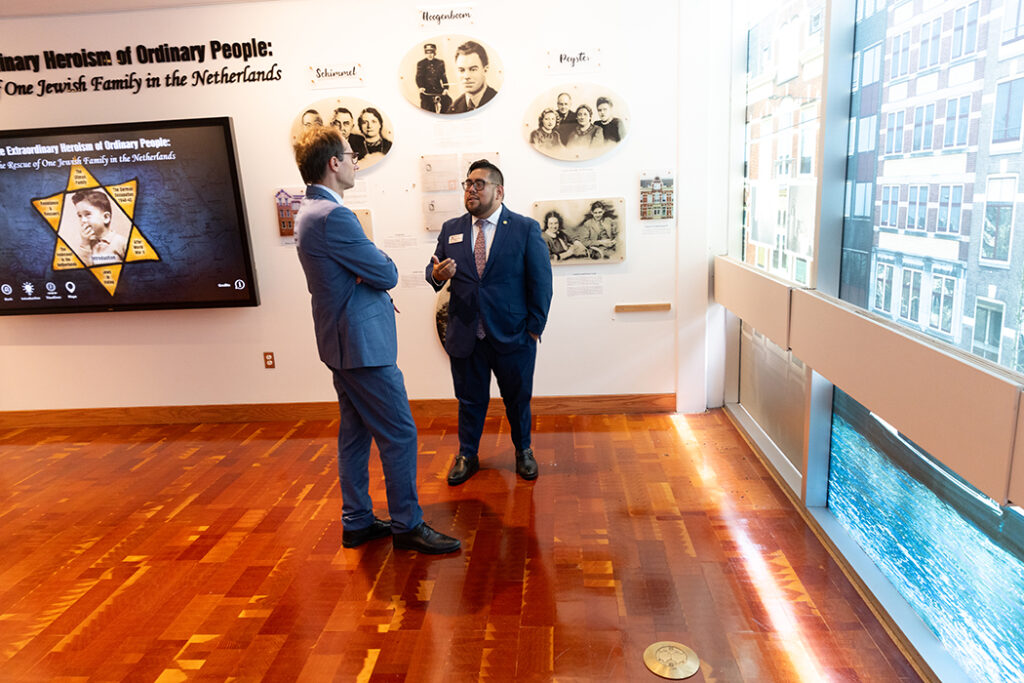
“The Executive Committee of the Sara and Sam Schoffer Holocaust Resource Center is extremely proud to have Irvin Moreno-Rodriguez succeed the late Gail Rosenthal as the executive director of the center. Irvin, as a Stockton graduate and assistant to Gail, brings years of experience and great continuity to his position,” said Leo Schoffer, a member of the HRC Executive Committee and son of Sara and Sam Schoffer.
As a scholar and teacher in the field, Irvin possesses a special understanding of Holocaust and genocide studies that he transmits to his students and the many people who attend the center’s programs and seminars.
Moreno-Rodriguez said that special understanding comes from his life as a first-generation student whose parents emigrated to the United States from Mexico. The story of Holocaust survivors escaping to the United States and to Latin American countries resonates with him.
“The Holocaust serves as a warning of what happens when you don’t treat people with respect. What happens when you really start spreading lies and rumors and misinformation about people and creating fear and xenophobia about others, of immigrants,” he said. “It’s very much a warning about what can happen, but it’s also a reminder that in the darkest point in history, you still had streams of light that were willing to go out and save and rescue lives.”
Both Schoffer and Moreno-Rodriguez know it’s very difficult to replace Rosenthal, who joined the Holocaust Resource Center in 1991 and was its director until her death on Oct. 13, 2023. She was a huge mentor and influence on Moreno-Rodriguez’s life — even helping him obtain scholarships to attend Stockton.
“I don’t know how many people would go out of their way to help a young Mexican American busboy in a pizzeria,” said Moreno-Rodriguez about the time he first met Rosenthal the summer after he graduated from Atlantic City High School in 2011. “And to give me the confidence, the skills, the bravery to go out into a complicated world and to be kind and to try and make a difference in other people’s lives.”
Moreno-Rodriguez worked with Rosenthal at the center since 2018 and was a frequent volunteer there while a Stockton student from 2011 to 2015, acting as an informal tour guide for outside groups. Schoffer is confident in Moreno-Rodriguez’s ability to lead the Holocaust Resource Center into the future.
“Irvin is very well-known and respected in his field and will bring his many connections to the center. We are truly excited with the future that Irvin will bring to the center and Stockton University,” he said.
That future includes strengthening the center’s partnerships off campus, like with the Jewish Federation of Atlantic and Cape May Counties, and creating more programming for everyone. Since January, Stockton’s Holocaust Resource Center has offered more than 200 programs that are free and open to the public — a 165% increase over 2023.
“We don’t want our center to just do events for students. We are more than that. We want events for students, faculty, staff and the community,” he said.
One of the first programs he helped organize was a virtual discussion in January on combating antisemitism in the classroom with renowned Holocaust scholar Michael Berenbaum. The HRC partnered with Kean University’s Holocaust Center, the Jewish Federation of Greater MetroWest NJ in Morris County and the Center for Holocaust, Human Rights and Genocide Education at Brookdale Community College in Monmouth County.
“We can’t work in silos. We really need to start working together and unite during these difficult times. That will only make us all stronger,” Moreno-Rodriguez said. “I want people to know what we are doing and why it’s so important today with the rise of open antisemitism.”
He also wants to continue the center’s role as a “safe space” on Stockton’s campus for students and reinforce existing relationships the center has with other campus groups.
“I feel that everyone knows about the center, but not everyone knows what we do, and there’s a difference,” he said.
He mentioned a recent study tour with Stockton’s Alliance Heritage Center where K-12 teachers traveled to South Jersey locations tied to the Alliance Colony, the first successful Jewish agricultural community in America, and the center’s Holocaust Survivors of South Jersey Project.
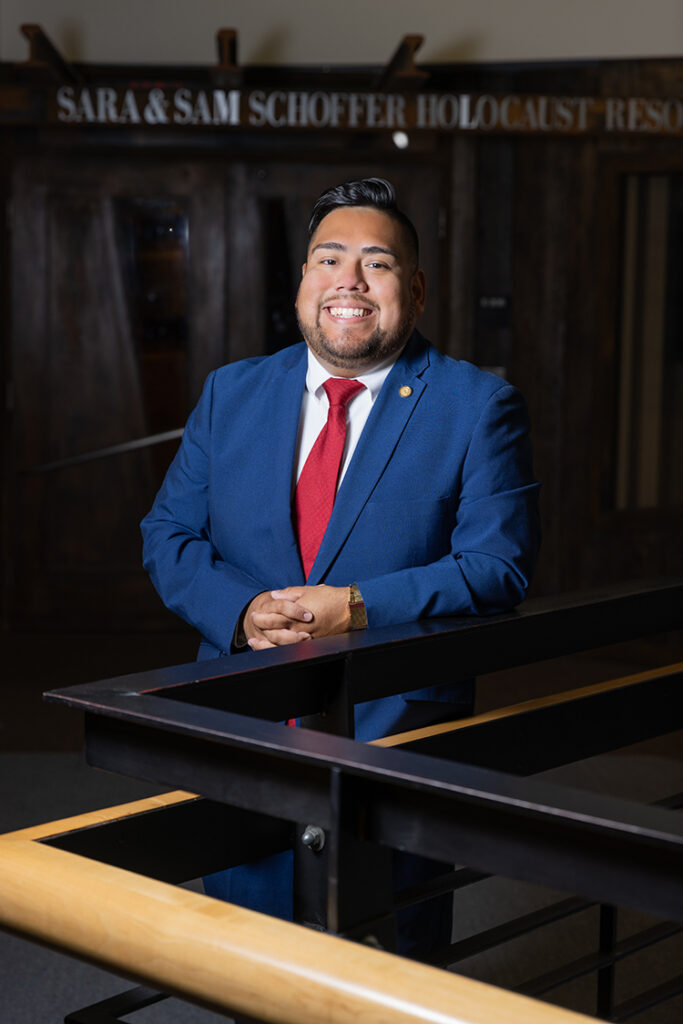
He has taken steps to promote Stockton’s high school dual credit program in Holocaust and Genocide Studies and proactively set up professional development programs for teachers at schools such as those in Winslow Township and Bridgeton. He also wants to improve the center’s website to include video resources and lesson plans for teachers.
Moreno-Rodriguez is also a strong believer in student study tours — whether that involves traveling abroad to visit concentration camps in Europe or participating in virtual tours of the Anne Frank House or the Sobibor extermination camp, which the center was the first to offer to high school students earlier this year.
“We really need to emphasize these experiences. Whether students can travel abroad, that’s always a financial issue, but if we can bring these experiences home, I feel like we can start closing the gap,” he said. “It’s one thing learning from a book. It’s another thing being led through these experiences by one of the directors of the Sobibor Museum or one of the managers of the Anne Frank House. I know these tours can change the lives of students. It changed my life.”
And while all of these programs mention the horrors of the Holocaust, they also demonstrate that there was goodness and kindness during that time — often shown by just one person.
“It’s so important that we teach these stories of rescue, resilience and resistance to students because we want them to be upstanders,” Moreno-Rodriguez said. “We want them to be good and kind to one another, and when that moment comes to stand up and do the right thing.”
Follow Us Today On:
Note from AC JosepH Media: If you like this story and others posted on Front Runner New Jersey.com, lend us a hand so we can keep producing articles like these for New Jersey and the world to see. Click on SUPPORT FRNJ and make a contribution that will go directly in making more stories like this available. Thank you for reading!

